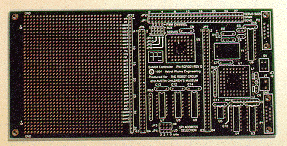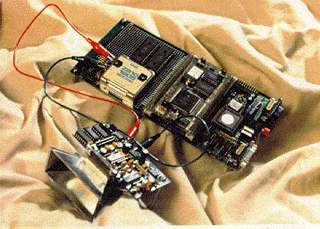Another effort of The Robot Group has been to develop a multi-purpose microcontroller system appropriate for controlling motors, sensors, and other devices.
Connected together in a network, groups of these systems can be controlled via a higher level central computer. This can be used to control complex robotics systems and can produce striking behavior of museum exhibits, and information about exhibit behavior and crown activity and interaction from one exhibit to the next.
The Exhibit Controller Board was initially designed as part of the Berzerkwerks (Aug. ’91) exhibit at Austin’s Children’s Museum and subsequently has been used in several Robot Group projects.
It incorporates a methodology to allow the onboard Motorola MC68HC11E9 microcontroller to control up to 28 servo motors. Each system provides connection for a Motorola MC68332BCC, a small but powerful MC68332-based computer system, which may act locally or serve as the master controller for up to 14 other systems.

Alex Iles designed the hardware and the software for servo control. He later revised the design to incorporate MIDI communications and to reduce the size of the circuit board.
Bill Craig developed a real-time distributed operating system allowing the network of exhibit controllers to operate at its full potential. The operating system runs on a Motorola MC68332BCC (which acts as the central controller) mounted on one of the networked boards.
Projects incorporating the exhibit controller include Big Rock Robotic Tower, Sparky, the Robotic Pup, and the Tai Chi Dancers (a moving sculpture consisting of choreographed robotic arms, which utilizes a network of controllers and the distributed operating system).
